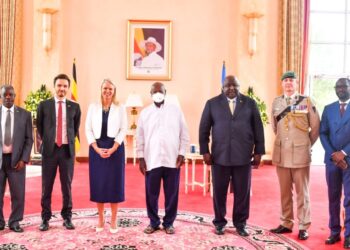Uganda Airlines CEO Jennifer Bamuturaki cites economic statuses and international restrictions as key challenges to African aviation industry growth.
During the 55th Annual General Assembly of the African Airlines Association (AFRAA) held at Speke Resort Hotel Munyonyo on Monday, Bamuturaki, who is also the president of AFRAA, highlighted the various challenges that Africa’s aviation industry is facing. She shed light on the multifaceted obstacles that are hampering the continent’s aviation aspirations.
According to Bamuturaki, the African aviation sector stands at a pivotal juncture, striving for expansion and modernization in an era fraught with impediments. Her observations accentuate the pivotal role economic stability plays in the trajectory of African airlines. With fluctuating economies across the continent and varying degrees of infrastructural development, the aviation landscape grapples with disparities that hinder its ability to soar.
Uganda Airlines’ leader emphasized the pressing need for sustained economic growth to fuel the industry’s aspirations, pointing out that economic stability serves as a linchpin for sustained progress and competitiveness.
“Globally, new sustainability requirements, pose specific challenges for African Airlines, this complicates an already difficult environment driving out the cost of fuel and imposing costly closures of air space. Blocked funds remain a concern of all Airlines in Africa and in some markets on the continent,” she said.
She also noted that taxation in the industry makes intra-African travel expensive. However according to Bamuturaki, despite the challenges, the African Aviation industry has shown remarkable resilience and continued with a milestone recovery from the Covid-19 hit.
“The latest numbers from the International Air Transport Association (IATA) report that the traffic in September 2023 was 28.1 per cent above the same period in 2022. This is true and we see these numbers in our operations but on a disappointing note, there have been no significant improvements in Africa’s shares on the global passenger market. It’s stagnant at 2.1 per cent. This is a result of many factors among them; the status of the African economy, restrictions and closed markets within the content,” she said.
She noted that the regulatory frameworks and restrictions emerge as a labyrinthine challenge obstructing the aviation industry’s growth in Africa. Her remarks reflect the intricate web of regulations that African airlines navigate, hindering their operational efficiency and expansion endeavours.
Fragmented regulations, bureaucratic hurdles, and varying compliance standards across borders contribute to operational complexities and escalate costs for airlines.
The call for harmonized and streamlined regulations resonates strongly in Bamuturaki’s assessment, highlighting the urgent need for a cohesive and standardized regulatory environment to foster a conducive landscape for aviation growth.
“However, it can be argued that the fastest way to improve this metric is to speed up market liberalization, to increase Intra-African travel and justify why we need to invest as operators with additional aircraft capacity with infrastructure upgrades and regulatory revisions,” she noted.
In articulating these challenges, Bamuturaki’s insights extend beyond Uganda Airlines, encapsulating the shared struggles and aspirations of aviation stakeholders across the African continent. The convergence of economic status and regulatory complexities underscores a pressing imperative for collaborative efforts among governments, industry players, and regulatory bodies.
Therefore, addressing these hurdles demands a concerted approach involving policy reforms, infrastructural investments, and regional cooperation to propel African aviation towards sustainable growth and global competitiveness. The AFRAA president’s perspective serves as a clarion call for concerted actions aimed at surmounting these challenges and unlocking the boundless potential of the aviation industry in Africa.
Do you have a story in your community or an opinion to share with us: Email us at editorial@watchdoguganda.com













